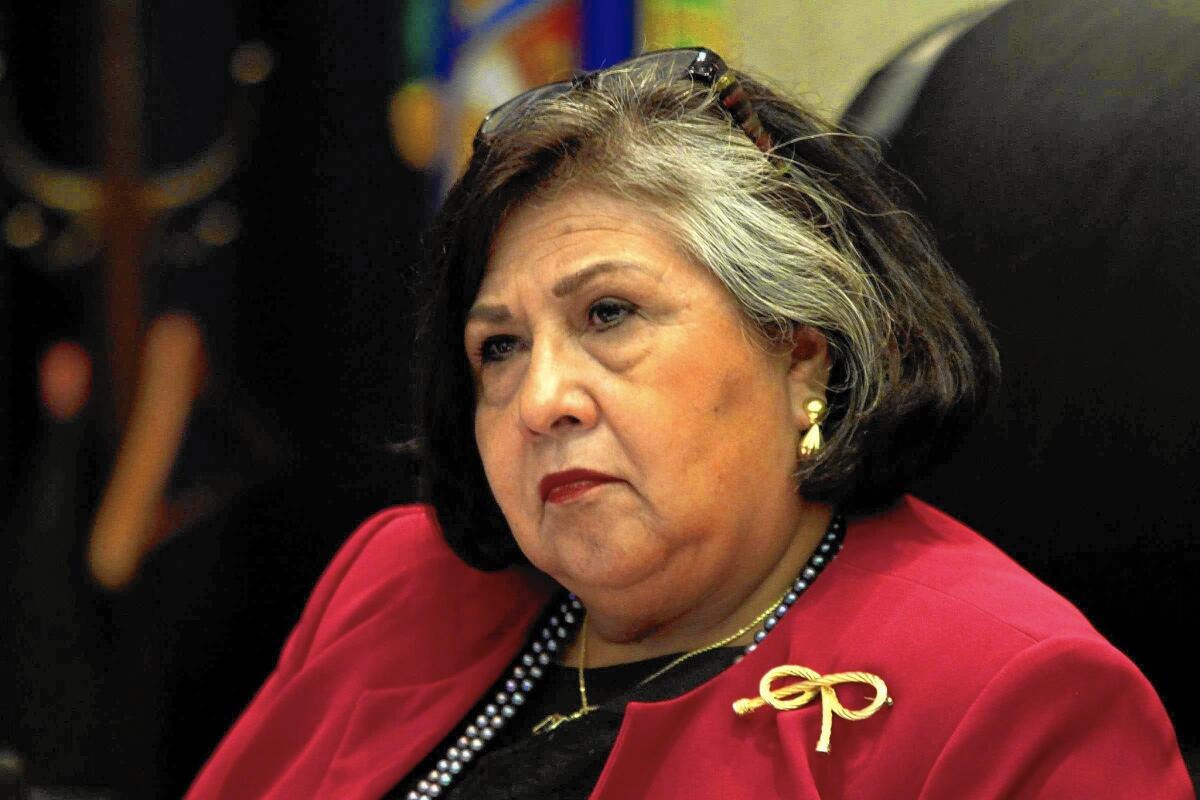L.A. City Council candidates pledge to take pay cut if elected

- Share via
As L.A.’s election season heats up, several candidates for City Council are taking aim at lawmakers’ six-figure salaries — the highest among the nation’s largest cities — saying they would return part of their pay if elected.
Former L.A. County Supervisor Gloria Molina, running for an Eastside council seat, said Thursday that she would cut her city pay by roughly two-thirds if she succeeds in ousting Councilman Jose Huizar. Nonprofit leader Tomas O’Grady, looking to replace Councilman Tom LaBonge in a Silver Lake-to-Sherman Oaks district, said he would give up half his salary. And one of O’Grady’s rivals, businesswoman Sheila Irani, said she would divert $50,000 of her pay to neighborhood grants.
Compensation for L.A.’s council has tripled since 1990 and is now $184,610 per year. “I frankly don’t think we’re worth” that much, said Irani, a former LaBonge aide.
A Times survey found L.A. lawmakers’ pay exceeds that of their counterparts in the nation’s five largest cities. And four years ago, the Pew Charitable Trusts reported that L.A. had the highest average council salary among 15 big cities studied. Phoenix and Houston currently pay $61,600 and $62,580, respectively. New York City, with 51 council members, offers a base salary of $112,500, with up to $20,000 more for top council leaders.
In L.A., political analysts say promises to cut pay are largely symbolic in light of the city’s $5.1-billion general operating budget. But they add that a pledge to give up pay can help candidates stand out politically — especially in the crowded, 14-contender primary race to replace LaBonge.
Tom Hogen-Esch, professor of political science at Cal State Northridge, said voters who show up in primary elections — like the March 3 contest for six council seats — tend to be more conservative. That’s “probably part of the calculation” behind the pay-cut pledges, he said.
Voters with doubts about the effectiveness of city government may have trouble stomaching the current council salaries, said Franklin Gilliam, dean of the UCLA Luskin School of Public Affairs. Still, neither he nor Hogen-Esch expect a large shift in votes based on promises to forfeit pay.
“It strikes me as primarily a campaign tactic,” Hogen-Esch said. “It puts the other candidate on the defensive, to either say why they’d keep their salary or follow suit.”
O’Grady used that strategy in front of an audience at a candidate forum last month, when he pressed opponent Carolyn Ramsay to state whether she would commit to a pay reduction. Ramsay, who served until recently as LaBonge’s chief of staff, said she would. She did not specify how large a salary cut she would take.
Ramsay clarified her position in an email exchange with The Times. She said she stands by her pledge but thinks the level of City Council compensation should be reviewed by a citizens’ commission. Ramsay also made clear she didn’t appreciate O’Grady’s line of inquiry.
“It was a disappointing and low level attempt at a gotcha question by one candidate trying to score political points,” said Ramsay, who earned $133,840 last year working for LaBonge.
O’Grady and Irani contend the current salaries undermine the credibility of council members during contract negotiations, making it harder for lawmakers to argue that city workers should agree to concessions on pay raises, healthcare and retirement benefits.
“There is a huge gap between the median income of constituents and the salaries of their elected representatives,” said O’Grady, who collects income from rental properties and running a nonprofit group. “I believe the smaller that gap is, the better the decision-making will be.”
Yearly median household income in Los Angeles is just above $48,000, according to U.S. Census figures. Council salaries have increased by roughly that amount since 2001.
In 1990, voters agreed to boost council pay 40% to $86,157, as part of a larger package of ethics reforms following a series of scandals in the administration of Mayor Tom Bradley. The measure also tied council salaries and increases to compensation received by municipal court judges.
About a decade later, council salaries were bumped up again after voters paved the way for a court consolidation that pushed municipal judges’ pay to the level of Superior Court jurists.
Former City Councilwoman Ruth Galanter, who held office from 1987 to 2003, said there’s some logic behind judges receiving large salaries, since they could find better paying jobs in the private sector. Council members, on the other hand, aren’t likely to find other jobs that pay as much as they get now, Galanter said.
“Unless they become lobbyists,” she added.
In Huizar’s downtown-to-Eagle Rock district, Molina framed her pay-cut pledge as part of a larger critique of her opponent and the city’s budget, which she called “a mess.” She said she would use her salary reduction to bolster basic services.
But Molina’s pay-cut promise has been a moving target. On Tuesday, she sent a mailer to voters promising to give up half her salary, or about $90,000. Two days later, she increased the figure to $124,000, after learning her county pension would reach that amount. Molina said she wanted to make sure her promised pay cut offsets her entire county retirement income.
Molina’s pay-cut pledge appears to be largely a defensive move. Returning part of a city salary could help blunt accusations that she’s “double dipping” — taking a salary from one government job while earning a pension from another.
Parke Skelton, Huizar’s campaign consultant, suggested Molina is running for city office to increase her overall public pension income. He said if Molina wins she could boost her yearly retirement pay by at least $30,000 after four years in office.
For his part, Huizar has no intention of giving up a portion of his salary, Skelton added.
“He’s got kids to support. He’s got a family,” he said. “I don’t think he’s in a position where he could take half the salary.”
More to Read
Sign up for Essential California
The most important California stories and recommendations in your inbox every morning.
You may occasionally receive promotional content from the Los Angeles Times.












